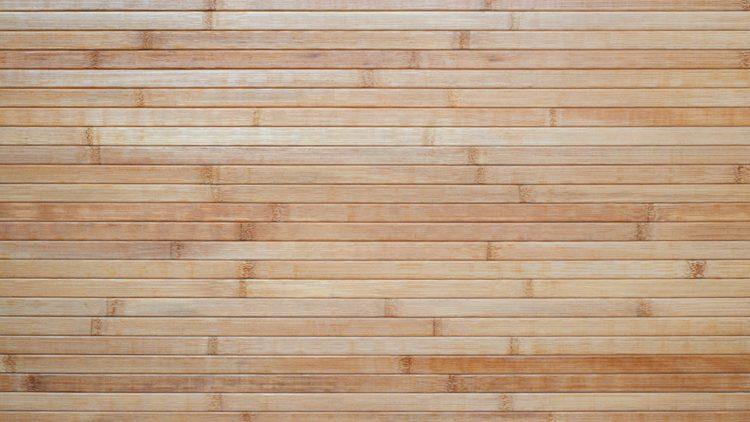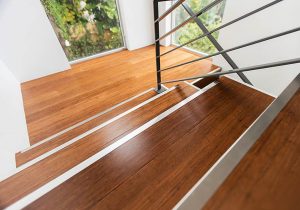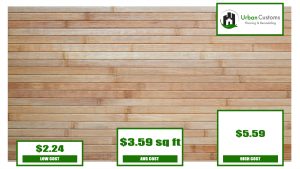How To Make Bamboo Floors Shine
Bamboo flooring is a wonderful option for today’s homeowners. However, it is up to you to keep this flooring in tip-top shape! If you are searching for “how to make bamboo floors shine,” this post is for you!
Cleaning Bamboo Floors
Make sure you take as many preventative steps as possible with your flooring. For instance, try to reduce traffic on the flooring as much as possible. Everyone knows that wear and tear is the number one enemy of bamboo flooring. Walking on bamboo constantly will introduce the surface to foreign dirt, dust and grease. It is recommended to simply take your shoes off whenever you walk across the bamboo.
Place rugs or carpets over the parts of the bamboo flooring that experiences the most foot traffic throughout the day. Also, be careful with any furniture that may be placed on the flooring. It won’t take much at all for heavier furniture to damage the bamboo. Invest in furniture padding to decrease the wear and tear on the floor.
Use this four-step guide to ensure your bamboo floor shines:
- Polish bamboo flooring
- Sweep regularly
- Mop the floor
- Finish with a hardwood cleaner
Polish Bamboo Flooring
Have a natural home cleaning solution handy when attempting to polish these floors. The cleaning process will start with polishing and finish with the use of a hardwood cleaner. Remove all dust, dirt, debris and grease completely before the shining. Follow these few steps to make your bamboo flooring shine.
Sweep Regularly
If your flooring experiences even a light amount of foot traffic, there will still be a lot of dirt and debris to clean up. The best way to perform this task is by sweeping it up. Although, using a vacuum for the cleanup can be useful, as well. Refrain from using a beater bar attachment while vacuuming, though. Make sure you go around and collect dust from all corners and crevices of the flooring area.
Mop The Floor
After you have swept or vacuumed thoroughly, the next step here involves a mop. Use vinegar for the mopping. Vinegar will clean the floor without harming the bamboo in any way. Mix one cup white vinegar with four cups of warm water to create the cleaning solution. Never use a steam mop on bamboo flooring, as this can warp the material.
Finish With A Hardwood Cleaner
It is possible to complete the cleaning process with a simple mopping, but if you want the floor to truly shine it’s worthwhile to finish with a hardwood cleaner. Always wear gloves when using this cleaner! Commercial hardwood cleaners will work well on bamboo surfaces. Follow the manufacturer’s instructions when using any type of hardwood cleaner. Protect yourself by wearing gloves and any other safety gear possible.
Routine Bamboo Floor Cleaning
Are you looking to keep your bamboo flooring in top shape throughout the years? Follow these steps to keep your bamboo flooring in the best shape possible:
Use The Right Cleaning Supplies
Before jumping into the cleaning, one must make sure they are armed with the right cleaning supplies. Bamboo style flooring is much different than other common types of flooring; therefore some specific supplies are needed for the task. Start by knowing exactly what bamboo strand type and the finish type you currently have. Vertical or horizontal strand bamboo, for example, tends to be softer than other strands, making it much easier to dent. With these particular strands, we can’t stress enough how careful one should be when moving furniture in preparation of cleaning.
Clean Spills And Scuffs Immediately
Be proactive by taking care of ordinary spills as soon as possible! Use a soft, dry cloth to clean up any accidents off the bamboo flooring. Afterwards, it is recommended to then wipe the spot with a fresh cloth, dampened with water. Dry the spot when the job is complete. Placing a rug around any sinks or areas prone to spills is recommended for homeowners choosing to lay bamboo flooring in their kitchen. Save yourself the hassle of cleaning by protecting this valuable surface. Always make sure to use the proper cleaning supplies when attacking a stain or spill. But, the good news is bamboo floors can be refinished, so all is not lost if you scuff the flooring.
Perform Routine Cleaning
As is the case with most floors, routine cleaning is suggested for bamboo flooring. Take the following preventative tips to keep your bamboo in the best shape possible for years to come. To protect the surface, try keeping any pets’ nails at a short length. Shoes walking across the flooring is not recommended on a regular basis. Refrain from using rubber or latex mats on the floor, as these can trap moisture. Sunlight can also fade bamboo flooring over time, so try not to keep furniture or other items in the same spots for long periods of time.
How Much Does Bamboo Flooring Cost?
Of course, two costs will be associated with bamboo flooring: the actual purchase of the product plus installation. Flooring is typically priced by square footage, while installation goes by total area and labor costs. The average cost of materials will come to about $480 for a 125-square-foot area. Add in a typical $500 installation charge, and the total should come out just below $1,000. Average installation cost for a larger, 200-square-foot room is just over $1,500 total.
There are a numbers of factors that will affect the overall cost of installation. The pre-existing flooring that needs to be removed can offer challenges and a longer process for installers. Keep in mind the condition of your current flooring when trying to estimate expenses. Existing moldings and baseboards will result in higher installation costs. Generally, a sealant will be required post-installation for the bamboo flooring. The average cost of the sealant is $40.
Here’s a breakdown of bamboo flooring costs, per square footage:
- Lowest cost: $1.49–$2.99
- Average cost: $2.19–$5.00
- Highest cost: $3.59–$7.68
Bamboo Flooring Benefits
Here are a few bamboo flooring benefits:
- Easy installation
- Eco-friendly
- Affordable
- Bug resistant
- Unique looking
- Low maintenance
First and foremost, this is an eco-friendly choice for flooring. Bamboo plants can regenerate in as little as 5 years. Hardwood trees can take more than 30 years to fully regenerate. Bamboo is readily available, and will not impact the ongoing destruction of rainforests all throughout the world. It’s a flooring option that you can truly feel good about! Durability, as mentioned before, is a main benefit of bamboo flooring. This durability is a big reason why bamboo becomes so affordable over time. Installation is also a breeze. Professionals can quickly install bamboo, giving your home a new, breathtaking look. If that isn’t enough for you, it must be noted that this one is one of the lowest-maintenance flooring options on the market today. Unlike hardwood, bamboo may never need to be refinished because it is so durable. It is also moisture resistant, which is perfect for young families that may be prone to spills and accidents in the kitchen area.
Urban Customs Installs Hardwood Flooring In Phoenix, Arizona
At Urban Customs we offer all types of flooring installation in Phoenix, Arizona, including Wood flooring, stone flooring, and bamboo flooring. Request a free flooring installation quote from Urban Customs today! Our address is 8050 N 19th Ave #127, Phoenix, AZ 85021.




